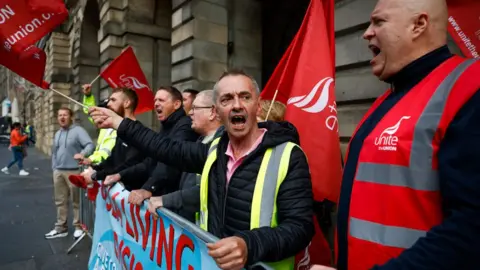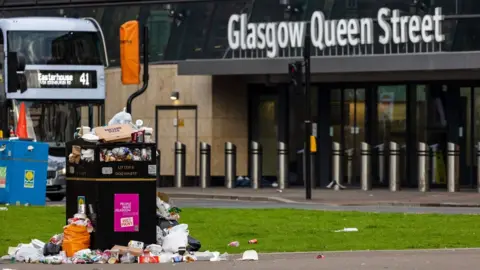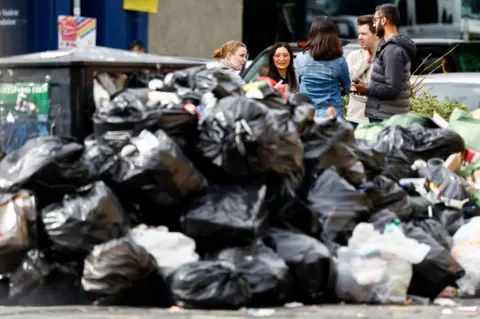Strike action in Scotland to continue as unions reject pay offer
Unions have confirmed they will continue strike action after turning down a new pay offer from councils.
Unite and the GMB both rejected the Cosla offer while Unison, Scotland's largest council union, said it would put it to members.
Rubbish has been building up in many town and city centres after several days of bin strikes.
The dispute led to action in two-thirds of Scotland's councils and is set to close schools and nurseries next week.
Cosla said it was "disappointed" with the response from unions.
Unions had been seeking an agreement from the local government body similar to the one made to council workers in England - which included a £1,925 flat rate pay increase.
They said that offering a percentage pay rise would mean the most money would go to the best paid staff.
The current round of strikes is due to end on Wednesday in many local authority areas, and at 04:59 in Edinburgh.
The first bin strike began in the capital city on 18 August, in the midst of festival season, after the GMB, Unite and Unison rejected an initial pay offer equivalent to a 3.5% increase.
 Getty Images
Getty ImagesIt escalated last week when refuse workers at a further 20 local authorities, including Glasgow, Aberdeen and Dundee, walked out despite a revised 5% offer.
A second wave of strikes, which will include school workers, is due to begin in a bid to "achieve a significantly improved pay offer".
Hundreds of schools and nurseries are scheduled to close from 6 to 8 September.
Cosla's offer of a £1,925 pay uplift matched an offer to council workers south of the border, but only part of this payment was consolidated into council workers' ongoing pay. The rest would be given as one-off cost of living payments.
Those earning less than £20,500 - about 20% of council staff in Scotland - would receive a pro-rata gross pay increase in 2022 equal to £2,000.
All staff would also get an extra day of leave.
'Real-terms pay cut'
Unite criticised the negotiations as a "waste of precious time" because new offer disproportionately hits the lowest paid.
The union's industrial officer Wendy Dunsmore said: "In real terms it leaves the lowest paid workers no better-off and a significant proportion of the offer does not enhance overtime, allowances or pensions."
Mark Ferguson, chair of Unison's local government committee, said strike action was the "last resort".
"Half of council workers earn less than £25,000 per year and 85% earn less than £39,000 per year - they are all worrying about paying their bills," he said.
GMB Scotland senior organiser Keir Greenaway said they had written to Cosla urging them to return to talks as soon as possible.
He said: "It's not credible that in the grip of the biggest cost of living crisis in forty years, a head of service gets four times the consolidated increase than a bin collector, cleaner or carer."

Stinking slime on the streets of Auld Reekie

By Angie Brown, BBC Scotland Edinburgh reporter
The noxious ooze now covering Edinburgh's city centre streets from leaking bins full of rotting mountains of rubbish is quite startling.
Not only is it now quite hard to dodge these massive middens, as the Scots call them, but it is almost impossible to avoid walking through the rivulets of slime washing over our pavements in Auld Reekie.
I tasted the nastiness of this when I mistakenly touched my bike wheel and caught a whiff of the worst smell on my hands that I had ever encountered.
In the first few days of the strike, litter was swirling around in our narrow cobbled streets in the Old Town and I remember being quite horrified when the inside of a brown-smeared vegetarian haggis packet slapped me in the face.
Now all that rubbish is stuck to the ground - trampled and glued to the pavements by I don't know what - causing a layer of detritus you might expect from the days, hundreds of years ago, when Edinburgh folk threw their rubbish out of their tenement windows shouting "gardyloo".

Cosla said its offer was at the "absolute extremes" of affordability.
Resources spokesperson Katie Hagmann said: "This is already an offer which is stretching our already stretched finance like never before.
"We have done everything we possibly can to get to this stage and that this offer - which is still on the table - is as good as it gets."
The Scottish government has given an additional £140m to councils to help fund a pay increase for staff and had urged both sides to seek a "fair resolution" to the dispute.
Deputy First Minister John Swinney said it was offering a further £200m over two years to provide a cost of living payment to workers earning below £39,000.
He said this additional payment would mean workers on a £20,000 salary would receive a £2,000 increase pay - equivalent to 10%.
Mr Swinney said: "Intensive discussions between the trades unions and COSLA over recent days has led to a revised pay offer being made.
"No deal is perfect and I wish we could go further but this deal does offer significant increases for those on low pay.
"We must now respect the democratic trade union processes under way while we hope that members decide to accept the offer."
 Dan Bell
Dan BellCity of Edinburgh Council said many residents would not have their full backlog of waste collected before the next round of industrial action begins on 6 September.
The 140,000 households which have kerbside pickups in the city have landfill waste and dry recycling waste collected on alternate weeks.
The city council confirmed only one type of rubbish would be picked up per household.
However, additional resources will be deployed to support the clean up when the strike ends in the capital on Tuesday.
Council leader Cammy Day said: "This dispute has brought the value of our waste and cleansing teams - and their right to fair wage - into sharp focus and I'm delighted they'll be back out from Tuesday, helping to return our city to its best."
He asked residents to store their waste "little longer" while refuse workers catch up with the backlog.
Residents are being asked to put their bins out as normal on their scheduled collection day, when extra waste will be collected if it is bagged.
 Getty Images
Getty ImagesEnvironment convenor Scott Arthur said while he had been "ashamed" of some of the images of the capital over the past week said he supported waste collection workers and believed they deserved a pay rise.
Public Health Scotland has warned of a human health risk from overflowing waste, and advised councils to decontaminate areas where bins have overflowed.
Professor of public health at the University of Edinburgh Linda Bauld told BBC Scotland their concerns included pests and vermin that are attracted to waste, bacteria, and the effects on surface water.
"There certainly could be an opportunity for germs and bacteria to spread if we don't sort this out," she said.
She warned people not to touch the waste.
"I know people are trying to still shove things in the bins if there is a bit of space - don't do that and if you do please use a hand sanitiser or wash your hands," Prof Bauld added.
